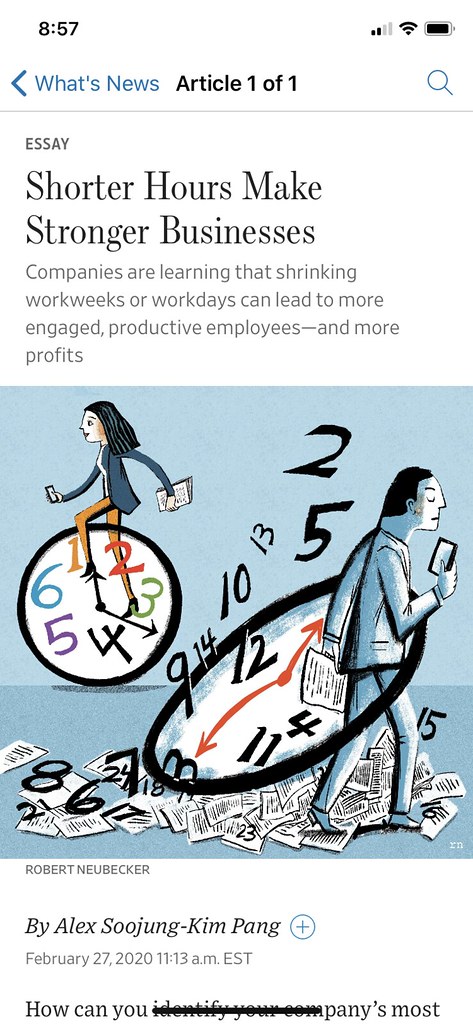“The inflexible 9-to-5 work model is gradually being replaced by a more adaptable and personalized approach.” [entrepreneur.com]
“The nature of jobs will change, rather than being completely replaced.” [jam.co.uk]
.
THE FOUR-DAY WEEK NOW:
The case for a Four Day Week seems to be growing, from the growing evidence on how it might improve staff resilience to the growing interest in rural communities.

The latest Newsletter from the European Work Time Network summarises where we are in the UK:
Autonomy published a report on companies’ experience of the shorter working week one year on from the 2022 4-day week pilot results release…
The Scottish Government has launched a public sector 4-day week pilot currently involving 140 staff. Staff are working a 32-hour week, 3 hours less per week…
South Cambridgeshire District Council cabinet agreed to continue its four-day week trial while it awaits to hear about potential penalties from central government...
Trade union staff from the civil service trade union, PCS, are in conversations about a four-day week at DEFRA…
ASDA, a UK supermarket, has confirmed it’s been experimenting with various flexible working initiatives. This included a small 20-store trial of a “four-day working week for the same pay and benefits”…
4ugust is a new initiative that has been launched by the 4 Day Week Campaign and think tank Autonomy. The idea is that companies give their staff a four-day week, while keeping salaries the same, for the month of August. Alongside the bank holiday in the final week, this amounts to just additional days off: a mini trial...
Joe Ryle, Director of the 4-Day Week Campaign has published a book: ‘The 4 Day Week Handbook: Your Guide to Happy Staff, Smarter Working and a Productivity Miracle’.
AI AND THE FOUR-DAY WEEK
In parallel, there is growing interest in how Artificial Intelligence might allow for a more flexible work life balance, could help with burnout – and help society break free from the 9-to-5 mold:
Nobel Prize-winning economist Christopher Pissarides believes that AI can enable humans to work just four days a week. With the aid of AI, flexible work schedules empower individuals to allocate dedicated time to personal endeavors like quality family moments, pursuing hobbies, or prioritizing self-care activities. By nurturing a more harmonious work-life balance, AI isn’t just bolstering employee satisfaction and well-being but also improving productivity and overall job performance.
With the continuous advancement of AI, the inflexible 9-to-5 work model is gradually being replaced by a more adaptable and personalized approach. Professionals now have the chance to break free from the confines of the traditional workday structure. Embracing this transformation facilitated by AI can result in heightened productivity, increased job satisfaction, and a more balanced and fulfilling work-life equilibrium.
And looking at specifically where AI could help free up the working week, it could unlock the four-day work week for women and could really enable much better customer service – for example:
AI has the potential to replace 10-30% of the jobs in the UK, according to a report by the Department of Education. However, experts predict that the nature of customer service jobs will change, rather than being completely replaced. It’s important to note that AI is only as powerful as the information it’s given — it’s not helpful if it’s not used correctly, and humans are still needed in complex situations.
…